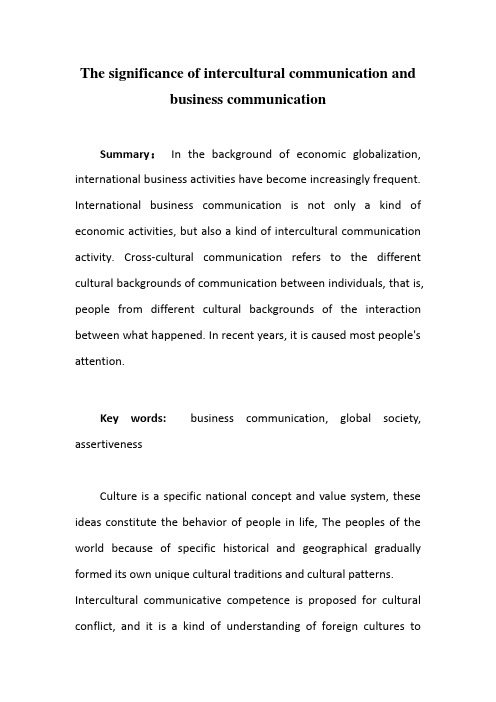跨文化交际与商务沟通在现实中的意义
跨文化交流在全球化商务中的重要性

跨文化交流在全球化商务中的重要性
在当今全球化的商务环境中,跨文化交流变得愈发重要。
不同文化背景之间的
交流和理解,能够有效促进商务合作的顺利进行,提升企业的国际竞争力。
重要性
1.有效沟通:跨文化交流可以帮助消除语言和文化上的障碍,确保信
息传递准确,避免误解和沟通失败。
2.建立信任:通过尊重对方文化和价值观,展示出合作的诚意,建立
起信任关系,为长期商务合作打下基础。
3.提升效率:了解对方文化的沟通方式和工作习惯,可以帮助双方更
好地协调合作,降低沟通成本和误解的几率。
4.创新思维:不同文化的碰撞和交流会激发出更多的创意和想法,促
进商务合作模式的创新发展。
实践方法
1.学习对方文化:了解对方国家的历史、价值观和传统习俗,尊重并
适应对方的文化。
2.积极沟通:多沟通、多协商,以尊重、包容和开放的态度面对跨文
化交流中的挑战。
3.培养跨文化团队:招聘不同文化背景的员工,建立多元化的团队,
增加交流的广度和深度。
4.寻求专业指导:在需要的时候,寻求专业的跨文化顾问或翻译人员
的帮助,确保合作顺利进行。
结语
跨文化交流在全球化商务中扮演着不可或缺的角色,对于企业的发展至关重要。
只有通过有效的跨文化交流,企业才能更好地适应全球化经济的挑战,开拓国际市场,实现长期的可持续发展。
要把握这一商务沟通的关键,从而提升企业的竞争力。
跨文化交际与商务沟通在现实中的意义

The significance of intercultural communication andbusiness communicationSummary:In the background of economic globalization, international business activities have become increasingly frequent. International business communication is not only a kind of economic activities, but also a kind of intercultural communication activity. Cross-cultural communication refers to the different cultural backgrounds of communication between individuals, that is, people from different cultural backgrounds of the interaction between what happened. In recent years, it is caused most people's attention.Key words: business communication, global society, assertivenessCulture is a specific national concept and value system, these ideas constitute the behavior of people in life, The peoples of the world because of specific historical and geographical gradually formed its own unique cultural traditions and cultural patterns. Intercultural communicative competence is proposed for cultural conflict, and it is a kind of understanding of foreign cultures tomaster the basic knowledge and communication skills, the ability to cross-cultural communication flexibility in practical problems arise.Intercultural communication is becoming increasingly important due to the rise of globalisation and increasingly multicultural work environments. Because of this, the cultural intelligence and cross-cultural communication skills that come with studying in a foreign country are highly sought after by employers who seek to gain a competitive edge and break into in foreign markets. So, we should understanding culture differences in our world today is vital to advancement in all aspects of living----economic, medical, educational, military, religious, legal, government, and political. It is especially important in the business world because of the ways in which business connections are so global[1].So these programmes in order to offers you an opportunity to raise your cross-cultural awareness and enhance your intercultural communicative competence in international business settings, to reflect on your own culture and language use, and to develop the professional and business communication skills necessary to advance your career in the international business world.Intercultural communication is a form of communication that aims to share information across different cultures and socialgroups. It is used to describe the wide range of communication processes and problems that naturally appear within an organization or social context made up of individuals from different religious, social, ethnic, and educational backgrounds. Intercultural communication is sometimes used synonymously with cross-cultural communication. In this sense it seeks to understand how people from different countries and cultures act, communicate and perceive the world around them. Many people in intercultural business communication argue that culture determines how individuals encode messages, what medium they choose for transmitting them, and the way messages are interpreted.[2] In business fields,culture becomes into the lever and lubricant influencing those business activities. Thus,cultivating talents with intercultural communication competence is the final purpose of business English teaching. This paper has analyzed the reasons for the lacking of cultivating of intercultural communication competence in business English teaching by using the theories like the relationship between culture and language and communication competence,and then it suggested some ways to cultivate such kind of competence. In these ways,it is hoped that will cultivate more talents with excellent quality of intercultural communication competence and suitable for this age of economic globalization.Under the current situation of increasingly frequent international communication, the final aim of business English teaching is to cultivate inter-disciplinary talent who not only master business professional knowledge but also have cross-cultural communication competence.Assertiveness is the quality of being self-assured and confident without being aggressive. In the field of psychology and psychotherapy, it is a learnable skill and mode of communication. Dorland's Medical Dictionary defines assertiveness as: a form of behavior characterized by a confident declaration or affirmation of a statement without need of proof; this affirms the person's rights or point of view without either aggressively threatening the rights of another (assuming a position of dominance) or submissively permitting another to ignore or deny one's rights or point of view.[3] Think of specific situations when the communication went terribly wrong. Think now about the impact you had on it. You cannot change others, but by being assertive, you can improve the situation! For example, if you feel that your parents didn’t allow you to build strong self-esteem, this you cannot change. What you can change, however, is to take responsibility for your actions now and in the future in order to overcome your insecurity. In short, transform paralysing thoughts in actions.Remember, individuals arecapable of drawing nourishment from cultural differences and similarities. Becoming more sensitive to differences and acquiring the communication skills of your second culture will allow you to become more independent and capable of using the right skills to express yourself.In conclusion, becoming assertive will allow you to be more expressive, humorous, creative and capable of putting meaning into situations and to apply the right communication skills in the most diverse environments.This is a learning experience that you can incorporate slowly into your identity, allowing you to build bridges instead of burning them.The same is applicable to difficult situations with people from your own cultural background who have different personalities.[1].The Influence of Culture in The World of Business P46[2] Lauring, Jakob (2011). "Intercultural Organizational Communication: The Social Organizing of Interaction in International Encounters". Journal of Business and Communication 48.3: 231–55.[3]"assertiveness" in Dorland's Medical Dictionary。
商务与跨文化沟通

商务与跨文化沟通商务领域中的跨文化沟通是一项重要而复杂的任务。
在全球化的背景下,不同国家和地区的文化差异对商务交流产生了深远的影响。
为了有效地进行商务合作和交流,了解和适应不同文化之间的差异是至关重要的。
本文将探讨商务与跨文化沟通的重要性以及应对跨文化挑战的策略。
第一部分:商务与跨文化沟通的重要性在全球化的商业环境中,跨国公司和国际贸易的增加使得跨文化沟通成为了商务成功的关键。
跨文化沟通的能力能够促进商务合作、打破障碍以及建立强大的商业关系。
以下是商务与跨文化沟通的重要性:1. 提高商务谈判的成功率:不同文化的商务伙伴可能对合同条款、谈判方式和交易方式有不同的理解和期望。
通过了解对方文化的价值观和行为规范,可以更好地解决潜在的冲突并达成互利的协议。
2. 增强商业关系:正确的跨文化沟通可以帮助建立信任和尊重,从而增加商业伙伴间的合作机会。
了解对方的文化背景,尊重和适应对方的价值观,并且展示自己的文化敏感度,将有助于建立长期的商业关系。
3. 解决问题和减少误解:语言、非语言和行为的差异可能导致误解和沟通障碍。
通过适当的跨文化沟通技巧,可以更好地解释和理解对方的意图,减少不必要的误解,避免潜在的冲突。
第二部分:应对跨文化挑战的策略面对跨文化挑战时,以下策略可以帮助商务人士更好地进行跨文化沟通:1. 学习和了解文化差异:在涉及到与其他国家或地区进行商务交流之前,学习和了解对方的文化背景、价值观和行为规范是必要的。
这可以通过阅读相关文化指南或参加跨文化培训来实现。
2. 考虑语言和非语言沟通:语言和非语言的差异是跨文化沟通中常见的挑战。
商务人士应该努力学习对方的语言,并充分准备以利用适当的非语言沟通技巧,如姿态、表情和身体语言。
3. 适应性和灵活性:在商务交流中,灵活性和适应性是跨文化沟通的关键。
商务人士应该表现出对不同文化的尊重和理解,并做好准备调整自己的行为和决策以适应不同的文化环境。
4. 跨文化团队合作:在跨国公司中,建立跨文化团队可以帮助解决跨文化沟通的挑战。
探究跨文化交际对国际商务的影响

探究跨文化交际对国际商务的影响随着全球化进程的加速,越来越多的国际商务活动涉及到不同国家和地区之间的交流与合作。
跨文化交际在国际商务中发挥着重要的作用。
本文将探究跨文化交际对国际商务的影响,并分析其重要性和应对策略。
一、跨文化交际的重要性1.1 消除语言障碍不同国家和地区拥有不同的语言和表达方式,语言障碍是国际商务中常见的问题。
跨文化交际可以帮助商务人士理解并消除语言障碍,确保双方能够准确沟通,避免误解和不必要的翻译错误。
1.2 理解文化差异不同国家和地区的文化差异是影响国际商务的重要因素之一。
通过跨文化交际,商务人士可以更好地理解并尊重不同文化的价值观、礼仪习惯和商业实践,避免因文化差异引起的冲突和误解。
1.3 建立信任和关系国际商务往往需要与不同国家和地区的合作伙伴建立稳定的信任和良好的关系。
跨文化交际有助于双方建立互信,增进彼此之间的了解和友好合作,为商务合作打下良好的基础。
二、跨文化交际对国际商务的影响2.1 拓展市场和机会跨文化交际能够帮助企业更好地了解不同国家和地区的市场需求和机会,为企业拓展海外市场提供重要信息。
通过与本地人员的交流和接触,企业能够更好地适应当地市场,提供符合当地需求的产品和服务。
2.2 提高商务谈判的成功率在国际商务谈判中,双方往往会受到不同文化的影响而产生误解和冲突。
通过跨文化交际,商务人士可以更好地理解对方的立场和诉求,有针对性地调整自己的策略和方式,提高商务谈判的成功率。
2.3 降低文化摩擦和风险国际商务往往伴随着文化摩擦和不确定性的风险。
跨文化交际有助于商务人士加深对不同文化的了解,提前预判可能出现的问题和风险,并采取相应的措施进行风险管理,降低文化摩擦所带来的负面影响。
三、应对策略3.1 学习目标文化的语言和礼仪学习目标国家或地区的语言和礼仪是跨文化交际的基础。
商务人士应该积极学习对方的语言,提高沟通效率;同时,了解对方的礼仪习俗和商务惯例,以避免在商务场合产生尴尬或冲突。
跨文化沟通与国际商务

跨文化沟通与国际商务跨文化沟通在国际商务中扮演着至关重要的角色。
由于不同国家和地区的文化差异,商务活动面临着许多挑战和障碍。
因此,有效的跨文化沟通变得尤为重要,在国际商务中达成共识和有效的合作。
本文将探讨跨文化沟通对国际商务的重要性,以及在不同文化间展开业务活动时应该注意的关键要素。
第一部分:跨文化沟通的重要性跨文化沟通对国际商务至关重要。
在国际贸易中,各种类型的文化因素都可能影响商业交流和决策。
了解并适应不同国家和地区的文化差异是成功开展全球业务的关键。
1. 提高商务合作的效率:通过跨文化沟通,不仅可以消除由于语言和文化差异带来的误解,还可以建立信任和共识,从而提高商业活动的效率。
有效的跨文化沟通可以促进沟通双方更好地理解对方的需求和期望,确保合作达到预期效果。
2. 避免文化冲突:文化差异可能会导致冲突和误解。
了解不同国家和地区的商业礼仪、价值观和行为准则是避免冲突的关键。
通过适应对方的文化,尊重差异并避免冲突,可以建立积极的商业关系,并加强双方间的信任与合作。
3. 扩大全球市场:通过跨文化沟通,企业能够更好地了解全球市场,预测消费者需求并开发相应的营销策略。
适应不同文化背景的消费者需求,可以帮助企业在全球市场上取得竞争优势,并实现更大范围的商业拓展。
第二部分:跨文化沟通的关键要素要在跨文化环境中成功展开国际商务活动,以下是几个关键要素需要考虑:1. 语言和翻译:语言是跨文化沟通的基础。
确保准确的语言翻译和口译对于传递正确的信息至关重要。
商务合作中的任何误解或错误翻译都可能导致严重后果,甚至破坏商业关系。
因此,选择合适的翻译工具和专业的翻译服务是非常重要的。
2. 交际技巧和非语言沟通:除了语言之外,非语言沟通也是跨文化沟通的重要组成部分。
姿势、表情、目光接触以及交际礼仪等非语言因素都会影响商务交流的效果。
在与不同国家和地区的人员进行沟通时了解和尊重对方的非语言沟通习惯和文化背景是非常重要的。
3. 文化意识和敏感性:了解不同文化的价值观、信仰和习俗是避免冲突和误解的关键。
跨文化交流与商务谈判

跨文化交流与商务谈判在当今全球化的时代,跨文化交流和商务谈判变得愈发重要。
由于不同国家和地区的文化、语言、价值观等差异,进行跨国商务谈判可能会面临种种挑战。
然而,通过有效的跨文化交流和灵活的商务谈判技巧,我们可以克服这些障碍,实现双赢局面。
本文将探讨跨文化交流与商务谈判的重要性,并介绍一些应对策略和技巧。
一、跨文化交流的重要性在跨文化商务谈判中,了解并尊重对方的文化差异至关重要。
相互理解和信任是建立长期合作关系的基础。
通过有效的跨文化交流,我们可以避免误解和冲突,增进合作和协商的机会。
同时,跨文化交流也有助于拓展市场和加强国际竞争力。
二、跨文化交流的挑战1. 语言障碍:语言是文化的核心,不同的语言背后蕴含着不同的价值观和思维方式。
语言的不同可能导致沟通的困难和误解。
2. 礼仪差异:不同文化对待礼节和表达方式有不同的标准和期待。
在商务谈判中,了解对方的礼仪习惯是必要的,以避免冒犯或误解。
3. 价值观差异:不同国家和地区有着不同的价值观和信念体系。
这些差异可能影响到商业决策和合作方式。
三、成功的跨文化交流与商务谈判策略1. 学习和尊重他人文化:在跨文化交流中,尊重对方的文化差异是非常重要的。
努力学习和理解对方的价值观、礼仪习惯和商务习惯,以提升沟通效果。
2. 发展跨文化的沟通技巧:掌握有效跨文化沟通的技巧,如倾听、提问和简化语言。
使用简单明了的语言和图像辅助工具可以更好地传达信息。
3. 寻求共同点:在商务谈判中,寻找共同点可以帮助促进理解和构建共识。
通过了解对方的利益和需求,寻求双方的共同目标,并基于这些共同点来达成协议和决策。
4. 建立信任:跨文化商务谈判需要建立和加强信任关系。
通过与对方建立良好的人际关系,积极参与社交活动,加强信任感和合作意愿。
5. 适应和灵活性:在跨文化交流和商务谈判中,灵活性是非常重要的。
要能够适应和接受不同的文化差异,随机应变,寻求解决方案。
结论跨文化交流与商务谈判在当今全球化的环境中越来越重要。
国际商贸中跨文化交际的意义与现实问题

国际商贸中跨文化交际的意义与现实问题随着全球化进程的不断加速,国际商贸的交流与合作已经成为了现代经济发展的重要组成部分。
在这个过程中,跨文化交际扮演着至关重要的角色。
本文将就国际商贸中跨文化交际的意义与现实问题展开探讨。
一、跨文化交际的意义跨文化交际作为国际商贸密切合作的前提条件之一,具有如下重要意义:1.推进贸易往来。
国际商贸的基础是贸易往来。
不同国家之间文化差异较大,如果不能妥善处理好彼此文化的差异,容易产生误解和磨擦,从而影响贸易往来。
因此,只有了解和适应对方的文化,才能更快、更顺利地推进贸易往来。
2.提高交流合作效率。
文化差异严重会影响合作效率,使得沟通变得困难,易发生误解。
跨文化交际能够让合作双方更加了解彼此,迅速建立信任与合作,以最快的速度推进合作事项。
3.增加商业机会。
不同地区存在的文化差异常常衍生出新的商业机会。
例如,中华文化讲究礼尚往来,若了解和重视对方的礼仪,那么可能在合作过程中增加额外的商业机会,为双方带来更多的收益。
二、国际商贸中跨文化交际的现实问题尽管跨文化交际意义重大,但在实际操作中仍然存在一定的障碍。
下面是国际商贸中跨文化交际的现实问题:1.语言障碍。
因为语言和文化常常相伴出现,因此在国际商贸交流中,语言障碍是最大的问题之一。
如果双方的语言不同,那么在交流过程中难免会出现一些误解和矛盾,从而影响合作。
2.文化差异。
不同国家、不同地区存在着不同的文化。
例如,在中西方文化中,人们对时间的态度、礼仪习惯、交际方式等方面差异较大。
在实际交往中,对方可能因对方的的行为、言语、意图而感到困惑和不适,这也是一个常见的跨文化交际问题。
3.国家法律法规差异。
不同国家之间法律法规、行政管理等存在着差异。
如果双方没有做好提前了解、沟通和对接,可能会出现法律问题,导致贸易纠纷。
三、如何有效地开展跨文化交际在跨文化交际中,有效的沟通与互动对于促进国际商贸的发展至关重要。
以下是提高跨文化交际能力的几种途径:1.学习目标文化的历史、文化和民俗。
跨文化沟通对国际商务的影响和重要性

跨文化沟通对国际商务的影响和重要性现代社会国际交流日益频繁,跨文化沟通成为国际商务中不可忽视的因素。
在不同文化背景下,沟通方式、商务礼仪以及价值观念等方面的差异都会对商务活动产生重大影响。
因此,跨文化沟通在国际商务中的重要性日益凸显。
本文旨在探讨跨文化沟通对国际商务的影响,并强调其重要性。
一、文化差异对跨文化沟通的挑战不同国家和地区的文化背景之间存在显著差异,这包括语言、宗教信仰、价值观念、社会习俗等方面。
这些差异给跨文化沟通带来了挑战。
首先,语言障碍是跨文化沟通的重要问题之一。
即便使用同一种语言,不同地区的发音、口音、用词和语法习惯也可能导致理解的困难。
其次,宗教信仰和价值观的差异可能影响商务合作的开展。
商务有关道德准则、规范和商业行为的认知都受到文化背景的影响。
最后,社会习俗和商务礼仪的差异也可能导致误解和冲突。
对于国际商务人士来说,理解并尊重目标文化的社会习俗和商务礼仪的重要性非常关键。
二、跨文化沟通的重要性跨文化沟通在国际商务中具有重要的作用,对于促进商务合作的顺利进行至关重要。
首先,跨文化沟通有助于建立信任和互相理解。
通过跨文化沟通,双方可以更好地了解并尊重彼此的文化差异,建立起互信基础,增进双方之间的合作意愿。
其次,跨文化沟通可以减少误解和冲突。
通过有效的沟通,可以避免由于语言、文化差异而引发的误解和冲突,确保商务活动的顺利进行。
最后,跨文化沟通有助于发现商机和市场潜力。
通过深入了解目标文化,可以更好地掌握当地市场需求,并做出相应的商业决策。
三、有效开展跨文化沟通的策略为了在国际商务中有效地开展跨文化沟通,需要采取一系列的策略。
首先,学习和了解目标文化。
通过积极学习目标文化的语言、历史、宗教、价值观念等方面的知识,可以更好地理解和适应目标文化,避免因为文化差异而引发的问题。
其次,注重非语言沟通。
非语言沟通包括肢体语言、面部表情、眼神交流等,它们在跨文化沟通中起到了重要的作用。
虽然不同文化之间对非语言沟通的解读有所不同,但是注重细节和尊重对方的文化差异可以帮助建立更好的沟通氛围。
- 1、下载文档前请自行甄别文档内容的完整性,平台不提供额外的编辑、内容补充、找答案等附加服务。
- 2、"仅部分预览"的文档,不可在线预览部分如存在完整性等问题,可反馈申请退款(可完整预览的文档不适用该条件!)。
- 3、如文档侵犯您的权益,请联系客服反馈,我们会尽快为您处理(人工客服工作时间:9:00-18:30)。
The significance of intercultural communication andbusiness communicationSummary:In the background of economic globalization, international business activities have become increasingly frequent. International business communication is not only a kind of economic activities, but also a kind of intercultural communication activity. Cross-cultural communication refers to the different cultural backgrounds of communication between individuals, that is, people from different cultural backgrounds of the interaction between what happened. In recent years, it is caused most people's attention.Key words: business communication, global society, assertivenessCulture is a specific national concept and value system, these ideas constitute the behavior of people in life, The peoples of the world because of specific historical and geographical gradually formed its own unique cultural traditions and cultural patterns. Intercultural communicative competence is proposed for cultural conflict, and it is a kind of understanding of foreign cultures tomaster the basic knowledge and communication skills, the ability to cross-cultural communication flexibility in practical problems arise.Intercultural communication is becoming increasingly important due to the rise of globalisation and increasingly multicultural work environments. Because of this, the cultural intelligence and cross-cultural communication skills that come with studying in a foreign country are highly sought after by employers who seek to gain a competitive edge and break into in foreign markets. So, we should understanding culture differences in our world today is vital to advancement in all aspects of living----economic, medical, educational, military, religious, legal, government, and political. It is especially important in the business world because of the ways in which business connections are so global[1].So these programmes in order to offers you an opportunity to raise your cross-cultural awareness and enhance your intercultural communicative competence in international business settings, to reflect on your own culture and language use, and to develop the professional and business communication skills necessary to advance your career in the international business world.Intercultural communication is a form of communication that aims to share information across different cultures and socialgroups. It is used to describe the wide range of communication processes and problems that naturally appear within an organization or social context made up of individuals from different religious, social, ethnic, and educational backgrounds. Intercultural communication is sometimes used synonymously with cross-cultural communication. In this sense it seeks to understand how people from different countries and cultures act, communicate and perceive the world around them. Many people in intercultural business communication argue that culture determines how individuals encode messages, what medium they choose for transmitting them, and the way messages are interpreted.[2] In business fields,culture becomes into the lever and lubricant influencing those business activities. Thus,cultivating talents with intercultural communication competence is the final purpose of business English teaching. This paper has analyzed the reasons for the lacking of cultivating of intercultural communication competence in business English teaching by using the theories like the relationship between culture and language and communication competence,and then it suggested some ways to cultivate such kind of competence. In these ways,it is hoped that will cultivate more talents with excellent quality of intercultural communication competence and suitable for this age of economic globalization.Under the current situation of increasingly frequent international communication, the final aim of business English teaching is to cultivate inter-disciplinary talent who not only master business professional knowledge but also have cross-cultural communication competence.Assertiveness is the quality of being self-assured and confident without being aggressive. In the field of psychology and psychotherapy, it is a learnable skill and mode of communication. Dorland's Medical Dictionary defines assertiveness as: a form of behavior characterized by a confident declaration or affirmation of a statement without need of proof; this affirms the person's rights or point of view without either aggressively threatening the rights of another (assuming a position of dominance) or submissively permitting another to ignore or deny one's rights or point of view.[3] Think of specific situations when the communication went terribly wrong. Think now about the impact you had on it. You cannot change others, but by being assertive, you can improve the situation! For example, if you feel that your parents didn’t allow you to build strong self-esteem, this you cannot change. What you can change, however, is to take responsibility for your actions now and in the future in order to overcome your insecurity. In short, transform paralysing thoughts in actions.Remember, individuals arecapable of drawing nourishment from cultural differences and similarities. Becoming more sensitive to differences and acquiring the communication skills of your second culture will allow you to become more independent and capable of using the right skills to express yourself.In conclusion, becoming assertive will allow you to be more expressive, humorous, creative and capable of putting meaning into situations and to apply the right communication skills in the most diverse environments.This is a learning experience that you can incorporate slowly into your identity, allowing you to build bridges instead of burning them.The same is applicable to difficult situations with people from your own cultural background who have different personalities.[1].The Influence of Culture in The World of Business P46[2] Lauring, Jakob (2011). "Intercultural Organizational Communication: The Social Organizing of Interaction in International Encounters". Journal of Business and Communication 48.3: 231–55.[3]"assertiveness" in Dorland's Medical Dictionary。
